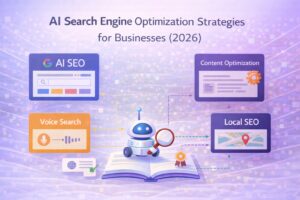As we move forward into 2024 and beyond, the landscape of search engine optimization (SEO) continues to evolve rapidly. Staying ahead of the curve and adapting your SEO strategies to align with the latest trends and best practices is crucial for achieving and maintaining online visibility. In this article, we’ll explore strategic SEO insights and tactical tips that will help you future-proof your digital marketing efforts and position your website for success in the years to come.
Strategic SEO Insights:
Prioritize User Experience and Core Web Vitals: Google’s increasing emphasis on user experience signals a shift toward a more holistic approach to SEO. Core Web Vitals, which measure factors like loading speed, interactivity, and visual stability, have become crucial ranking factors. Optimizing your website’s performance and delivering a seamless user experience across devices will be key to maintaining a competitive edge in search rankings.
Embrace AI and Semantic Search: As artificial intelligence (AI) and natural language processing (NLP) technologies advance, search engines are becoming better at understanding the intent behind user queries. This shift towards semantic search means that optimizing for specific keywords alone is no longer sufficient. Instead, focus on creating high-quality, relevant content that addresses user intent and provides comprehensive information on topics related to your industry.
Leverage Structured Data and Knowledge Graphs: Structured data and knowledge graphs are gaining increasing importance in SEO. By marking up your website’s content with structured data, you can improve how search engines interpret and display your information, potentially leading to rich snippets, knowledge panels, and other enhanced search features. This not only improves visibility but also provides users with a better understanding of your offerings.
Diversify Your Approach with Omnichannel Optimization: While traditional SEO focuses on optimizing websites for search engines, modern SEO strategies must consider a broader range of channels and touchpoints. This includes optimizing for voice search, virtual assistants, and other emerging technologies, as well as leveraging social media platforms and online directories to increase your brand’s online presence and discoverability.
Tactical SEO Tips:
Conduct Comprehensive Keyword Research: While keyword research remains a fundamental aspect of SEO, it’s important to go beyond traditional methods. Leverage tools that provide insights into user intent, search trends, and related topics to identify high-value, long-tail keywords that align with your target audience’s needs and behaviors.
Implement a Robust Content Strategy: Develop a content strategy that focuses on creating authoritative, evergreen content that addresses user queries and pain points. Incorporate a mix of formats, including text, visuals, videos, and interactive elements, to cater to diverse user preferences and engage your audience effectively.
Optimize for Technical SEO Factors: Technical SEO remains crucial for ensuring search engines can effectively crawl, index, and understand your website’s content. Stay on top of technical factors such as site architecture, XML sitemaps, robots.txt files, schema markup, and mobile responsiveness to maintain a solid technical foundation.
Prioritize Local SEO and Geo-targeting: For businesses with a local presence or targeting specific geographic regions, optimizing for local SEO is essential. Claim and optimize your Google Business Profile, leverage location-specific keywords and content, and build local citations and backlinks to improve your visibility in local search results.
Foster a Strong Backlink Profile: While the importance of backlinks has evolved over time, they remain a significant ranking factor. Focus on earning high-quality, relevant backlinks from authoritative sources through tactics like guest blogging, content partnerships, and strategic outreach.
Integrate SEO with Other Digital Marketing Channels: SEO should not operate in a silo. Integrate your SEO efforts with other digital marketing channels, such as social media, email marketing, and paid advertising, to amplify your reach and create a cohesive, multi-channel marketing strategy.
Continuously Monitor and Analyze Performance: SEO is an ongoing process that requires consistent monitoring and analysis. Regularly track key performance indicators (KPIs) such as organic traffic, rankings, conversions, and user behavior using tools like Google Analytics and Search Console. Use these insights to refine your strategies and stay ahead of the competition.
As the digital landscape continues to evolve, staying ahead of the curve with strategic SEO insights and tactical tips will be crucial for achieving long-term success. By prioritizing user experience, embracing emerging technologies, and implementing a comprehensive, data-driven approach, you can future-proof your SEO efforts and position your website as a leader in your industry.
Remember, effective SEO requires a commitment to continuous learning and adaptation. Stay informed about the latest developments, trends, and best practices, and be prepared to adjust your strategies accordingly. By doing so, you’ll not only maintain your online visibility but also stay ahead of the competition and ensure your brand’s long-term success in the ever-changing world of search.
About The Author
Jana Legaspi
Jana Legaspi is a seasoned content creator, blogger, and PR specialist with over 5 years of experience in the multimedia field. With a sharp eye for detail and a passion for storytelling, Jana has successfully crafted engaging content across various platforms, from social media to websites and beyond. Her diverse skill set allows her to seamlessly navigate the ever-changing digital landscape, consistently delivering quality content that resonates with audiences.





